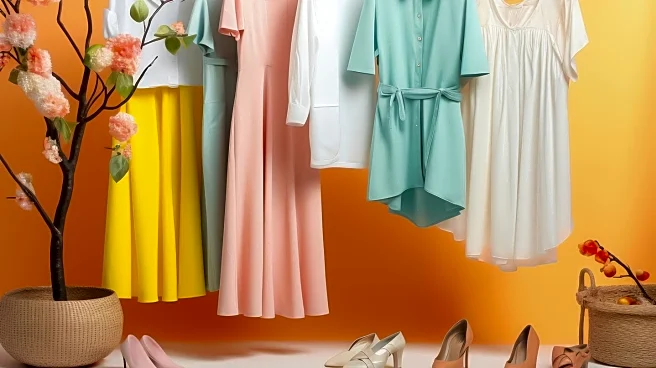What's Happening?
Tracy Reese's Hope For Flowers brand has launched its Spring 2026 Ready-to-Wear collection, showcasing a diverse range of fabrics and vibrant colors. Presented at the Designers & Agents trade show in New York, the collection was praised by buyers as Reese's best work yet. The collection features sustainable materials, including EcoVero georgette, used in frilled maxi dresses and shell tops. Reese emphasized the importance of brown prints, introducing espresso floral designs in bustier dresses and halter jumpsuits. The collection also includes structured harem pants, off-the-shoulder shirting, and pom-pom pants with cross-stitch embroidery. Reese's designs reflect a shift towards sustainability and a departure from traditional runway shows, focusing on impactful fashion production in Detroit.
Why It's Important?
The Hope For Flowers Spring 2026 collection highlights the growing trend of sustainability in fashion, with Reese utilizing EcoVero georgette, a sustainable sheer fabric. This move aligns with the industry's increasing focus on eco-friendly practices. The collection's emphasis on bold colors and diverse fabrics reflects a shift in consumer preferences towards unique and environmentally conscious fashion choices. Reese's decision to move away from traditional runway shows and focus on impactful production in Detroit signifies a broader industry trend of decentralizing fashion hubs and promoting local production. This approach could influence other designers to prioritize sustainability and local impact over traditional fashion norms.
What's Next?
Tracy Reese's Hope For Flowers brand is likely to continue its focus on sustainable fashion, potentially inspiring other designers to adopt similar practices. As the fashion industry increasingly prioritizes eco-friendly materials, Reese's use of EcoVero georgette could set a precedent for sustainable fabric choices. The collection's success may encourage Reese to further explore innovative designs and materials, while her decision to operate outside traditional fashion hubs could lead to more localized production models. The industry's response to Reese's approach may influence future fashion trends, emphasizing sustainability and local impact.
Beyond the Headlines
Tracy Reese's departure from traditional runway shows and her focus on sustainable production in Detroit highlights a cultural shift in the fashion industry. By prioritizing local impact and sustainable practices, Reese is challenging conventional fashion norms and promoting ethical production methods. This approach not only benefits the environment but also supports local economies, potentially leading to long-term shifts in fashion industry practices. Reese's emphasis on bold colors and diverse fabrics reflects a broader cultural trend towards individuality and self-expression in fashion, encouraging consumers to embrace unique styles.









